Click on title to expand……….
Club Meeting – 27th June – Speaker, Dr Tom Preston, gave a talk entitled ‘Fred Waldron – Engineer Extraordinary’.
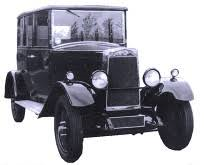
Fred Waldron’s Wayfarer car built in his own garage.
Dr Tom Preston introduced himself as a local historian who had worked at St Helens’ Archives.
During this work he had come across the history of Fred Waldron, who had been the Chief Engineer at Pilkington Glass Works. Frederic Barnes Waldron had achieved a great deal during his lifetime, and yet very few people have heard of him, and Tom could only find one photograph of him. However, the Institute of Mechanical Engineers presents a Frederic Barnes Waldron Award to the best Mechanical Engineering undergraduate in every UK university each year.
Fred Waldron was born in Sheffield in 1881. He went to the local school, and then on to the Central Science School, which is now part of Sheffield University. Here he was inspired by William Ripper, the Head of the School and a pioneer in work on high pressure steam as well as an educationalist. He, along with a number of other influential people, supported Fred’s application to join the Institute of Mechanical Engineers.
Fred’s career started at Firth’s Steel Works in Sheffield. He then moved to Birmingham, where he worked for Belliss and Morcom who made steam engines and turbines, before joining Thorneycroft shipbuilders in Southampton. Here he was believed to have been responsible for most of the design of the Acasta Class destroyers for the Royal Navy. He also worked with Sir Charles Parsons on the design of a very fast boat which used a steam turbine propulsion, before becoming actively involved in the use of steam turbines for electricity generation.
Edward Cozens-Hardy was an electrical engineer who became the Chief Engineer at Pilkington Glass Works in St Helens. He recruited Fred Waldron as his assistant, and they designed the electrical generating plant for the glassworks. This work was completed in 1914 and opened by King George V. Fred had only been working for Pilkingtons for a few years before the outbreak of WW1. His contribution to the war effort was to leave Pilkingtons and design and build the Dunlop tyre factory in Birmingham. Completed in 1915, at the time, it was the world’s largest brick built factory. He was then involved in the construction of a second Pilkington factory in Doncaster which remained in operation until the 1960s.
During his career, Fred took out 52 patents, including suction pads to pick up glass, and the ‘floating glass’ production process, both of which are still in use today. During a visit to the USA, he met Henry Ford, and negotiated a deal to supply Ford Car windscreens, which were exported from St Helens.
In 1928 Fred Waldron decided to design and build his own car, ‘The Waldron Wayfarer’. It was built in his shed, with the serial number 101 on both the chassis and engine, suggesting that he had visions of a production run, but St Helens Motors only ever produced one car! It was used extensively from its first registration in 1930 until the outbreak of WW2, when it was dismantled, and stored in his shed. It has since been restored.
Fred Waldron died in 1976, at the age of 95.
Dr Preston concluded by saying that Fred Waldron had made a great contribution to society, and it was surprising that so little is known about this amazing person.
Dr Preston then took questions from an appreciative audience.
Bowling – 25th June – Tatton Probus v Knutsford Rex
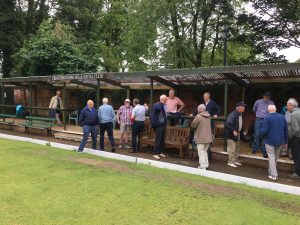
Players patiently wait for the result which they all knew was going to be a tight affair.
The eagerly awaited derby fixture against the members of Tatton Probus looked to be in threat of a postponement due to rain as the players congregated at the Crosstown Bowling Club.
The guys from Rex were finding some form so were up for a challenge to their friends from across town who have had the upper hand on these fixtures over recent seasons.
The decision was to play as the rain became fairly light although the green was very damp. As the scores came in from each game and the rain stopping it was looking to be a very competitive and tight affair. When all players returned to the clubhouse the result either way was not a certainty. With a recount of the total it was the Knutsford Rex players who were the most cheerful when a result of 102-100 was announced. So with relief a derby fixture had been reversed and the Knutsford Rex team can now look upon a winning run of four games.
Next Wednesday 3rd July Weaver Probus are the visitors to Knutsford Bowling Club starting at 2pm. The big question is can this winning run continue?
Walk – Ridgegate Reservoir – 20th June 2019
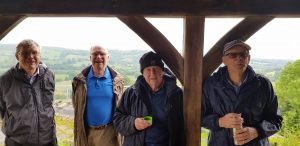
A rest awhile sheltering from the rain.
The Walking Group left Knutsford for the Macclesfield Forest area to walk from Ridgegate Reservoir to the Cragg Inn. Three of the five walkers were left sheltering under umbrellas at the reservoir in the pouring rain whilst two walkers drove their cars to the Cragg Inn, where they left one car for the return journey, and then returned to join the other walkers. During the walk, the weather improved, affording some splendid views, and then it rained again when they stopped for coffee at the now closed Hanging Gate Pub. The ensuing steep climb to the top of the hill was soon forgotten when they came within sight of the Cragg Inn for an enjoyable lunch.
Bowling – 18th June – Alderley Edge Probus v Knutsford Rex
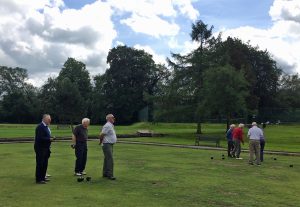
Nice to say the condition of the green was not needed for any excuses.
On a pleasant morning with the previous days rains blown away the Knutsford Rex bowlers travelled to Alderley Edge to play the local Probus club. The green was somewhat challenging and I am sure the Alderley Edge bowlers will concur that the conditions were far from ideal which in fairness was absolutely nothing to do with our friends from “The Edge.” So, the big question was if the Knutsford Rex could overcome the challenge or would home advantage count. It is pleasing to report that Knutsford Rex won by 99 points to 52 and now have a healthy sequence of three wins on the trot.
Next Tuesday afternoon the team make the short trip to Crosstown Bowling Club to play local rivals Tatton Probus. Crosstown has not been a lucky green for the Rex bowlers in recent years, hopefully this may just be their year.
Club Meeting – 13th June -Speaker, Professor Nigel Linge, gave a talk entitled ‘The Internet of Things (IoT).’

Professor Linge started his presentation by introducing a new acronym which we were likely to see a lot in the future – ‘The Internet of Things (IoT)’. We have moved from ‘analogue’ to ‘digital’, ‘digital’ to ‘smart’ and the next phase is from ‘smart’ to ‘IoT’. By 2020, billions of ‘things’ will be connected to the internet.
The internet was ‘born’ in 1969, when 4 computers were linked together in what was then called the ARPA network. Twenty years later in 1989, the World Wide Web was created, and in 1999, Nokia produced the first mobile phone which could access the web. 2002 saw the start of social media, where users themselves contributed to the web, and the world moved from an internet of services to an internet of people.
It is already possible to use a ‘smart’ phone to control central heating systems and security systems remotely. GPS on the phone will enable users to turn up their heating as they approach home. Control systems like Hive and Amazon’s Echo can already provide home services which are directly connected to the web, and Amazon’s ‘dot dash’ system enables users to order items on line when stocks are running low. Samsung already have a ‘smart’ fridge, capable of ordering items for the user. ‘Intelligent’ cars can have automated systems which improve road safety, and then Nigel went on to describe the ultimate intelligent car, which is driverless. Google and Salford University already have driverless cars undergoing field trials. After showing videos of the Google vehicle, and photos of the Salford one, Nigel then described how these vehicles could completely revolutionise our approach to car ownership and transport – making car ownership and car parks a thing of the past!
Having looked at the home and personal side of ‘smart’ systems, Nigel focussed on industrial processes which already benefit from web access and how this could evolve. Management of assets, predictive maintenance, stock control, more efficient automation, the list went on. In 2018, companies had invested over £21.3m in IoT in the UK.
Nigel then concluded his talk with a look at the IoT city, with smart street lights which save energy by only turning themselves on when they are needed, and lamp posts covered with IoT technology to improve communication speeds. Phone boxes which, currently display video adverts, can be switched to public information screens in the event of an emergency. The smart city would have smart highways, smart hospitals, smart factories, all connected to huge data processors, currently referred to as ‘the cloud’. By 2020, which is only next year, the growth in devices and data will be massive, and the demand for processor power unprecedented.
IoT will be part of everyday life, and the security of the system will be of critical importance.
Summer Lunch – Deanwater Hotel – Wednesday 12th June
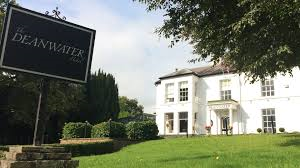
Sixty-three members, wives and widows attending the Summer Lunch at the Deanwater Hotel on Wednesday, 12th June. The food and the service was excellent, and the Secretary asked the members to show their appreciation to Ron Burrows for his work in organising the event. It was agreed that KRPC would use the same venue for next year’s summer lunch
Bowling – 11th June – Church Hulme Probus v Knutsford Rex
Unfortunately the persistent rain which continued throughout the day put paid to any chance of bowling. The match has now been re-arranged for Tuesday 10th September.
Trip to the Highways Agency England North West Control Centre – Monday 10th June

Forty members and wives visited the Highways Agency England North West Control Centre near Leigh on Monday 10th June.
The group were given an excellent presentation of the workings of the agency including many humorous anecdotes of life as a traffic officer on the motorway network.
Most of the group learnt a lot about safe driving, and was interested to learn that the Highways Agency’s main purpose was to keep traffic moving and have no jurisdiction with regards to speeding violations. The part of the presentation was about the smart motorways and all were surprised to learn that the lane closures and speed limits behind a broken down vehicle are triggered automatically by the stationary vehicle in front. The visitors were given a view of the impressive control centre operations room which could be viewed showing the many screens from varying cameras across the motorway network.
Walk – Bostock Green – Thursday 6th June
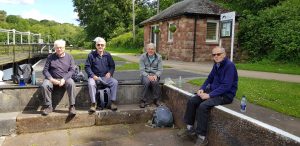
A pleasant rest alongside the Vale Royal locks
On Thursday, 6th June the walkers rambled in the Bostock Green area. The walk was attended by five people who went to Moulton, under the railway line to the Vale Royal Cut, along the Weaver Navigation Canal towpath to the Vale Royal Locks, and then back to the Hayhurst Arms for lunch. A total distance of 6.12 miles.
Bowling – 5th June – Knutsford Rex v Fulshaw Wilmslow Probus

“Its a call for pegs.”
Another cloudy day at Knutsford Bowling Club saw Knutsford Rex welcome their guests from Fulshaw Wilmslow Probus. In an extremely competitive encounter Knutsford Rex managed to beat the visitors by 113 chalks to 88. The match was there for the taking in whoever found form in the second half but the Knutsford bowlers gave no quarter and eventually saw them win with a perhaps a more flattering score than the actual games suggest.
Next Tuesday the team are on the road again travelling to play Church Hulme Probus at the Cranage green. Start 14:00.
Trip to Chester Zoo – Tuesday 4th June

The giraffes look quizzical at the strange fellows wandering their home.
Chester Zoo owns 400 acres of land, but were only currently using 125 acres, and over 27,000 species of animals, fish and insects were being looked after. The zoo is run by the North of England Zoological Society, and works in conjunction with other conservation groups around the world. The animals at the zoo have plenty of room and are well looked after. Chester Zoo employs 35 senior specialist conservation staff, who work to protect rare species from extinction.
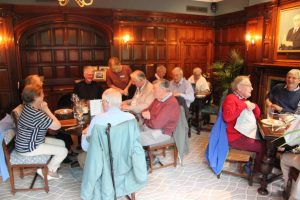
Upon arrival the party were advised to stay in small groups, as touring the zoo in a large group would be impracticable. As everybody went their separate ways, some on foot but a number using the zoo monorail system. Part way through the day most of the members met in the zoo restaurant for lunch. The group were led into a private, rather opulent oak panelled room for an excellent meal.
The afternoon was somewhat spoilt by the rain, this caused some of the visitors to go home early but a further visit has already been suggested as it takes easily more than a day to view the animals properly.
